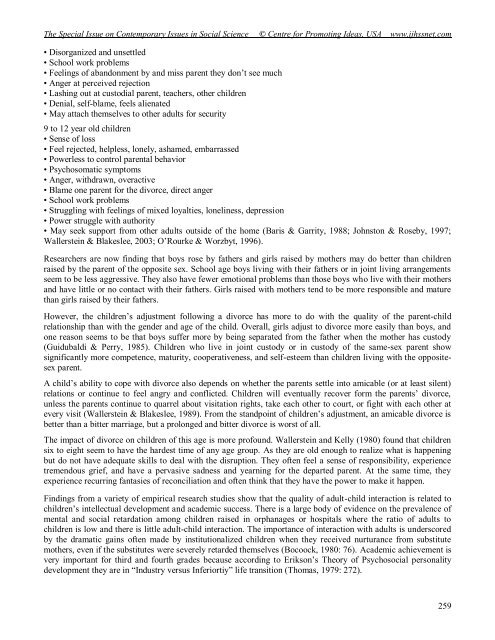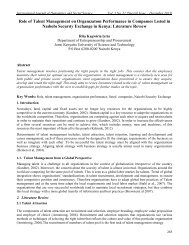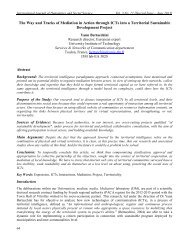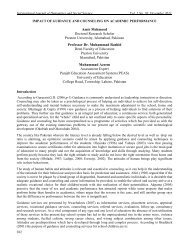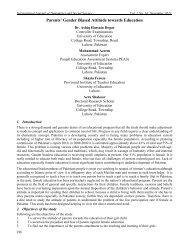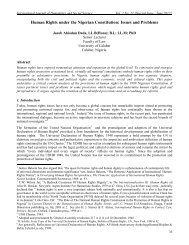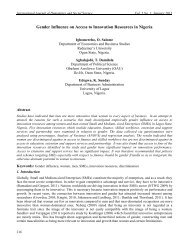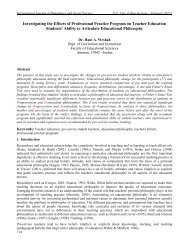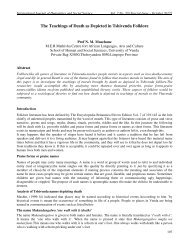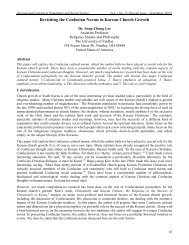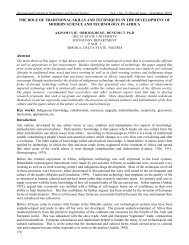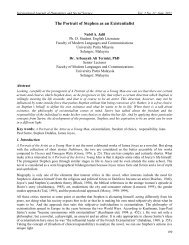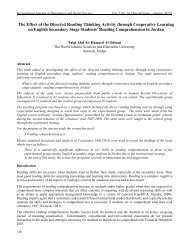Comparison of Single and Two Parents Children in terms of ...
Comparison of Single and Two Parents Children in terms of ...
Comparison of Single and Two Parents Children in terms of ...
Create successful ePaper yourself
Turn your PDF publications into a flip-book with our unique Google optimized e-Paper software.
The Special Issue on Contemporary Issues <strong>in</strong> Social Science<br />
© Centre for Promot<strong>in</strong>g Ideas, USA www.ijhssnet.com<br />
• Disorganized <strong>and</strong> unsettled<br />
• School work problems<br />
• Feel<strong>in</strong>gs <strong>of</strong> ab<strong>and</strong>onment by <strong>and</strong> miss parent they don‟t see much<br />
• Anger at perceived rejection<br />
• Lash<strong>in</strong>g out at custodial parent, teachers, other children<br />
• Denial, self-blame, feels alienated<br />
• May attach themselves to other adults for security<br />
9 to 12 year old children<br />
• Sense <strong>of</strong> loss<br />
• Feel rejected, helpless, lonely, ashamed, embarrassed<br />
• Powerless to control parental behavior<br />
• Psychosomatic symptoms<br />
• Anger, withdrawn, overactive<br />
• Blame one parent for the divorce, direct anger<br />
• School work problems<br />
• Struggl<strong>in</strong>g with feel<strong>in</strong>gs <strong>of</strong> mixed loyalties, lonel<strong>in</strong>ess, depression<br />
• Power struggle with authority<br />
• May seek support from other adults outside <strong>of</strong> the home (Baris & Garrity, 1988; Johnston & Roseby, 1997;<br />
Wallerste<strong>in</strong> & Blakeslee, 2003; O‟Rourke & Worzbyt, 1996).<br />
Researchers are now f<strong>in</strong>d<strong>in</strong>g that boys rose by fathers <strong>and</strong> girls raised by mothers may do better than children<br />
raised by the parent <strong>of</strong> the opposite sex. School age boys liv<strong>in</strong>g with their fathers or <strong>in</strong> jo<strong>in</strong>t liv<strong>in</strong>g arrangements<br />
seem to be less aggressive. They also have fewer emotional problems than those boys who live with their mothers<br />
<strong>and</strong> have little or no contact with their fathers. Girls raised with mothers tend to be more responsible <strong>and</strong> mature<br />
than girls raised by their fathers.<br />
However, the children‟s adjustment follow<strong>in</strong>g a divorce has more to do with the quality <strong>of</strong> the parent-child<br />
relationship than with the gender <strong>and</strong> age <strong>of</strong> the child. Overall, girls adjust to divorce more easily than boys, <strong>and</strong><br />
one reason seems to be that boys suffer more by be<strong>in</strong>g separated from the father when the mother has custody<br />
(Guidubaldi & Perry, 1985). <strong>Children</strong> who live <strong>in</strong> jo<strong>in</strong>t custody or <strong>in</strong> custody <strong>of</strong> the same-sex parent show<br />
significantly more competence, maturity, cooperativeness, <strong>and</strong> self-esteem than children liv<strong>in</strong>g with the oppositesex<br />
parent.<br />
A child‟s ability to cope with divorce also depends on whether the parents settle <strong>in</strong>to amicable (or at least silent)<br />
relations or cont<strong>in</strong>ue to feel angry <strong>and</strong> conflicted. <strong>Children</strong> will eventually recover form the parents‟ divorce,<br />
unless the parents cont<strong>in</strong>ue to quarrel about visitation rights, take each other to court, or fight with each other at<br />
every visit (Wallerste<strong>in</strong> & Blakeslee, 1989). From the st<strong>and</strong>po<strong>in</strong>t <strong>of</strong> children‟s adjustment, an amicable divorce is<br />
better than a bitter marriage, but a prolonged <strong>and</strong> bitter divorce is worst <strong>of</strong> all.<br />
The impact <strong>of</strong> divorce on children <strong>of</strong> this age is more pr<strong>of</strong>ound. Wallerste<strong>in</strong> <strong>and</strong> Kelly (1980) found that children<br />
six to eight seem to have the hardest time <strong>of</strong> any age group. As they are old enough to realize what is happen<strong>in</strong>g<br />
but do not have adequate skills to deal with the disruption. They <strong>of</strong>ten feel a sense <strong>of</strong> responsibility, experience<br />
tremendous grief, <strong>and</strong> have a pervasive sadness <strong>and</strong> yearn<strong>in</strong>g for the departed parent. At the same time, they<br />
experience recurr<strong>in</strong>g fantasies <strong>of</strong> reconciliation <strong>and</strong> <strong>of</strong>ten th<strong>in</strong>k that they have the power to make it happen.<br />
F<strong>in</strong>d<strong>in</strong>gs from a variety <strong>of</strong> empirical research studies show that the quality <strong>of</strong> adult-child <strong>in</strong>teraction is related to<br />
children‟s <strong>in</strong>tellectual development <strong>and</strong> academic success. There is a large body <strong>of</strong> evidence on the prevalence <strong>of</strong><br />
mental <strong>and</strong> social retardation among children raised <strong>in</strong> orphanages or hospitals where the ratio <strong>of</strong> adults to<br />
children is low <strong>and</strong> there is little adult-child <strong>in</strong>teraction. The importance <strong>of</strong> <strong>in</strong>teraction with adults is underscored<br />
by the dramatic ga<strong>in</strong>s <strong>of</strong>ten made by <strong>in</strong>stitutionalized children when they received nurturance from substitute<br />
mothers, even if the substitutes were severely retarded themselves (Bocoock, 1980: 76). Academic achievement is<br />
very important for third <strong>and</strong> fourth grades because accord<strong>in</strong>g to Erikson‟s Theory <strong>of</strong> Psychosocial personality<br />
development they are <strong>in</strong> “Industry versus Inferiortiy” life transition (Thomas, 1979: 272).<br />
259


